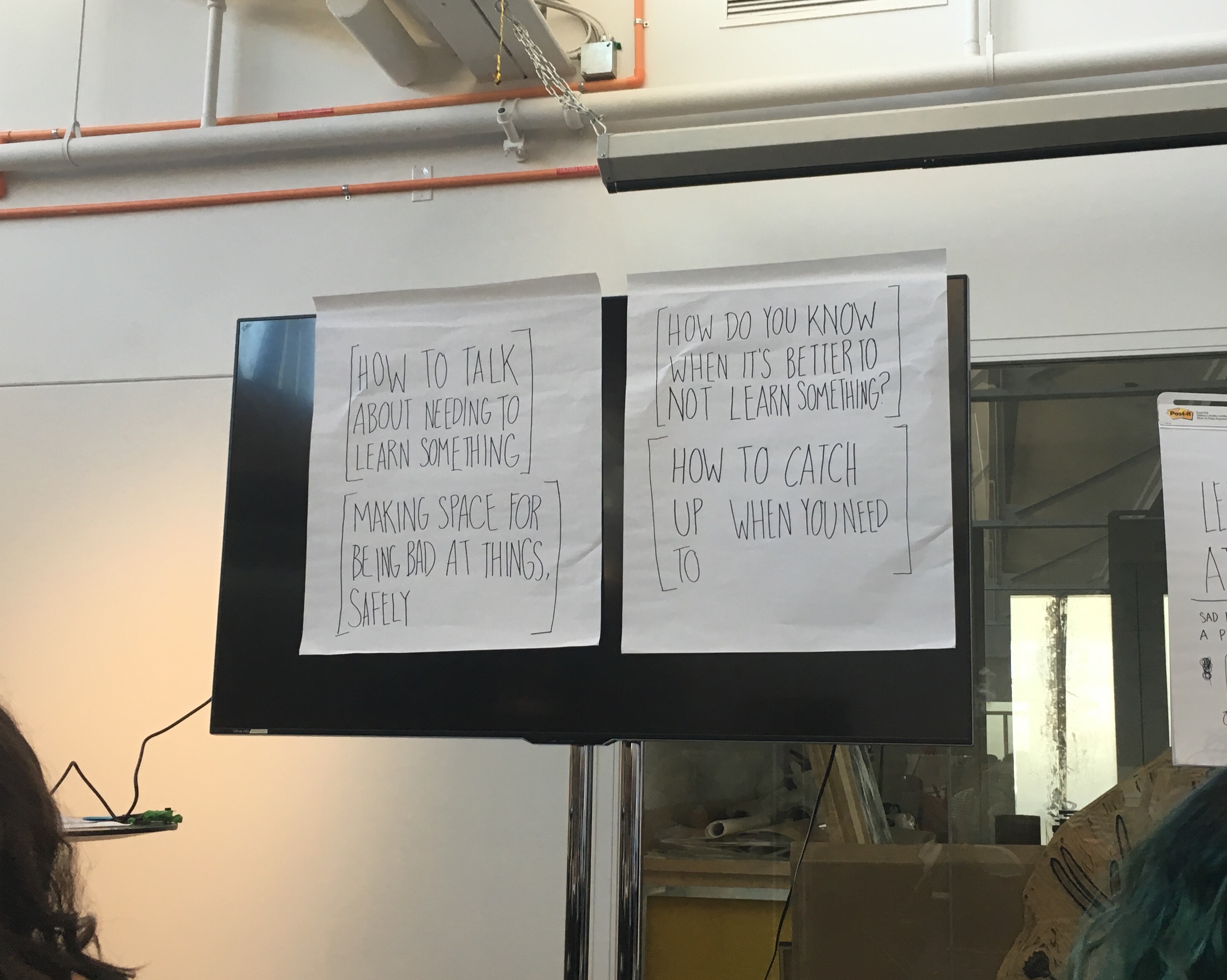SRCCON 2016

SRCCON!
This year, I was lucky enough to get a talk accepted to SRCCON, a collaborative, hands-on conference focused on overcoming practical challenges that newsroom and data journalists encounter on a daily basis. My colleagues at the New York Times had talked up SRCCON to me since basically the moment I started there, so even after I left the NYT, I was still determined to find a way to go to SRCCON and see what everyone was talking about.
Turns out that was a great idea. SRCCON is oriented around newsrooms, but the lessons are totally applicable to folks doing any kind of storytelling work in a data-driven field. I work at The Office for Creative Research, which is a hybrid research group focusing on technology, education, alternative interfaces, and data visualization. While OCR isn’t a news organization, I had a feeling that there’d be a lot of overlap in the kinds of stuff we did and the tools and strategies we used to do them. I came away from the conference with loads of new ideas, tools, and inspiration to share with colleagues. Not to mention pretty decent powerlifting skills, but I’ll explain that later.
Here’s what I went to. I’ve linked the Etherpad for each talk in case you want to see the collaborative notes, too.
Illustrating investigations: creating compelling visuals for abstract stories
I feel like this session was timed perfectly–it would have been a great session anytime, but the warm-up exercises were the perfect thing to get my brain in-gear for all the collaborative brainstorming that formed the backbone of SRCCON. We talked about “visual journalism” in a super-broad sense: hieroglyphics, cave art, tapestry narratives, emoji, etc. all as different forms of visual journalism, helping us report and record what’s going on in our lives. We then moved on to Scott McCloud’s classic ideas about realism vs abstraction, and what moving along that spectrum means (e.g., leaning towards abstraction may help the viewer see themselves in that image). We did warm-up blind contour drawings of each other, which is a great and somewhat terrifying icebreaker (“nice to meet you! Here’s a terrible picture I drew of you that makes you look like a monster”) and then moved on to illustrating sample headlines.
The facilitators gave out sheets that explained good ideation and critique practices. Being a MFADT alumna, I can ideate and critique til the cows come home, but I thought it was a really nice touch for folks who may not be as familiar with that process.
Giffable audio and the social web
This was my session! I know you’re all dying to read my notes, so I’ll be posting them up in full later. Mostly I just ran around (did I mention SRCCON has a lot of strong coffee?) while talking about UX and Star Trek and making terrible puns. Darius demoed Shortcut, which I can’t help but ooh and aah over every time I see it. Seriously, y’all are going to love it.
Covering police shootings (and other events) when the data is terrible
When I worked at the NYT, I was always kind of in awe of all the data journalists/interactive news folks. Folks like Jacqui Maher, Eric Buth, Erik Hinton, Anh-Thu and many more are such smart, talented, tenacious badasses that I’m still pleasantly surprised they follow me back on Twitter. This is all to introduce the fact that I’m accustomed to a pretty high level of badass in the newsroom, and this conversation brought even more badass to the table.
Basically–according to my notes–The Washington Post realized that there wasn’t a particularly accurate source for the number of police shootings that happen in the US. This was in part because the number reported by the FBI is based on voluntary reporting (?!). They decided to start their own tally, based on news reports, public records, internet databases, and original reporting, giving them both a more accurate number and the ability to record important metadata like age, race, gender, reported signs of mental illness, presence of a weapon, etc., which could lead to reporting leads.

What I loved and admired about this talk was how pragmatic it was. While they could streamline the process with scripts that students could use when they called police precincts, and while they had clever checks and balances built in to make sure they had accurate, audited data, ultimately it came down to a bunch of hardworking folks submitting FOIA after FOIA with the hopes that one day the government would pick up the reporting slack. It was a good reminder to me–as someone who primarily codes with data that’s already been collected–that data sure as hell doesn’t just come out of thin air.
Balancing mental health in the newsroom
Again, while this talk has “newsroom” in the title, it was one of those sessions that felt relevant to anyone working in public, in tech, on the internet, with data that can be upsetting. I joined a group that was talking about self-care strategies, and we shared a bunch:
- When working with upsetting content:
- Try to leave work at home, or at least have a “sacred space” in your house (e.g. your bedroom) where that content is never brought
- Keeping your space calm and abstract can be very soothing when you otherwise deal with graphic imagery
- Turn off autoplay on social media, so that upsetting video can’t just pop into your feeds
- When feeling overwhelmed:
- Try to set clear boundaries with people–if folks come to you to be negative about other people or other situations, timebox them
- See if you can delegate any of the things that make you stressed to someone who isn’t stressed by them–e.g., if your Twitter mentions are a dumpster fire, have a friend sift through them for you, rather than making yourself read them.
- When not feeling “worth it”:
- Frame self-care as a productive investment in yourself, not a drain on your time (one participant set up a self-care Bingo, which I loved)
- Do your best to practice self-compassion
- At work:
- Don’t wait to go to your manager until the moment you enter crisis mode–try to start the discussion and indicate your boundaries earlier
- Think about what you need as an employee (without falling into the self-hating “I shouldn’t need this”) and do your best to ask for it
- Find out what your mental health rights are (whether that’s time off, healthcare benefits, etc.)
- If you’re a boss, set up standard mental health practice for everyone, so that no one feels alienated, and so that more folks feel comfortable speaking up
It made me really happy that SRCCON offered sessions like these–it’s so easy to fall into the tech culture trap of “work until you die,” and I think more professional conferences should be taking proactive steps to change that culture.
Let’s all be terrible at things together
This was maybe my favorite non-technical session at SRCCON. Basically, everyone just got in a room and talked about all their fears and insecurities. It was a pretty cathartic end to a long day, and basically a non-stop “you feel that way too?!” of relief. Plus I told my story of accidentally causing a user registration system to silently fail for a week and got a healing citrine crystal as a prize. Pretty great.
I liked the set of prompts they had for discussion a lot:

Below is a slice of the taxonomy of insecurities we created together.
Evening activities: powerlifting and popping
SRCCON does this really rad thing where attendees teach little workshops together at night, mostly unrelated to anything journalism or tech-y. I learned good powerlifting form and the history of popping. I’m definitely better at the one that primarily requires brute force, rather than the one that requires, y’know, grace.
Open sourcing and you
In writing this writeup, I’m realizing that half the sessions I went to were basically oriented around soothing various anxieties. Works for me! This session was all about debunking common arguments against open sourcing, from the personal “my code is bad” to the internally political “legal won’t let us pick a license.” Most of what I took from it was the mantra “start open, stay open”–trying to open source after the fact rarely works out.
Beyond console.log: making the most of your developer tools
You know that meme of Lucille Bluth freaking out about Gene Parmesan? That was me.

This may be the most useful technical session I’ve ever taken at a conference, ever. Like the title says, there are a million debugging tools under the hood of your developer console, and we learned all of them. You’d be best served just looking at them here.
I took this session and found all my favorite debugging tools from Unity/C# that I hadn’t found in Javascript, and now I’m…… excited to write Javascript?! Trust me, that’s not a sentence I’ve ever said.
Lunch conversation: domain name hoarder confessional
Spoiler: we all enabled each other. I didn’t delete any of my extraneous silly domains, and in fact, during this session I became the proud owner of feelings.pizza. No regrets.
They don’t want you to lead: major keys to success as an underrepresented manager
This was a super useful and cathartic session in which we discussed and grouped micro (or macro) aggressions we’d faced and discussed tactics to deal with them. Again, you’d be best served reading the super-thorough notes.
Phew!
So yeah, SRCCON: super useful for me as someone coming primarily from data viz and storytelling, as someone who’s kind of type A and not always great at taking care of herself, and as someone who’s been stymied about how to move forward in a field that’s primarily dominated in folks not like me. I highly recommend it, not only as its own conference, but as an example for how I think more professional conferences should be run. I hope I get to go again next year.
Liked this post? Want to buy me a coffee? Throw me a tip here, if you like.